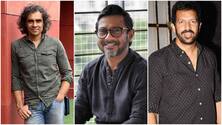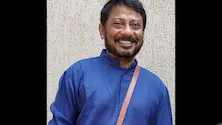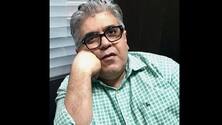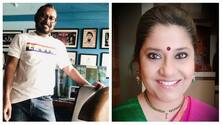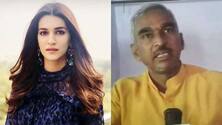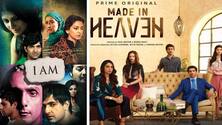Onir speaks on <i>Bas Ek Pal</i>
Courtesy: IndiaFM
Friday, August 11, 2006
He started of as an editor with some of the most prominent filmmakers in Bollywood like RGV and Prakash Jha. His directorial debut happened last year with the film My Brother Nikhil. Though not a very big hit, the film touched the audiences. It strongly conveyed how life of a person takes a drastic turn when detected HIV positive. Onir definitely put his message across strongly.
And now, he is back with his second film Bas Ek Pal which deals with urban life.
Tell us about your upcoming film Bas Ek Pal
Bas Ek Pal is film which centers round one moment which changes the lives of five characters. It's about that one moment that changes the perception of the characters about other characters. The format is that of a thriller where you keep discovering new things about the other person though it's not a "who's done it?" kind of a thing. I would say that this film is about one illusive moment of happiness that these characters are looking for.
The
tagline
says
the
film
it
is
about
"urban
relationships".
What
exactly
do
you
mean
by
that?
This
film
is
set
in
Bombay.
The
characters
are
modern,
upper
middle
class,
who
lead
a
very
independent
today's
life.
So
the
characters,
their
personalities,
their
lives
are
very
urban,
very
city
centric
and
cosmopolitan.
All
the
characters
in
my
film
are
living
on
their
own
and
not
in
joint
families
which
is
a
very
urban
phenomena.
In
the
rest
of
India,
even
smaller
towns,
people
usually
live
in
joint
families.
But
here,
the
character
of
Urmila
who
is
a
civil
engineer
lives
on
her
own.
Juhi
and
Rehaan
are
a
young
couple
who
are
living
on
their
own.
There
is
Jimmy's
character
who
is
a
businessman
who
is
also
living
by
himself.
So,
all
of
them
are
individualistic.
Also
their
lives
revolve
around
themselves
in
a
certain
way;
they
are
all
very
ambitious
which
is
very
urban
again.
Their
life
revolves
around
night
clubs;
they
do
sport
activities
and
things
like
that.
So
it
is
very
much
a
part
of
city
life.
Is
this
story
inspired
by
Jessica
Lal
case
in
any
way?
No,
not
at
all.
Actually
I
myself
wrote
this
story
and
it's
been
registered.
That's
the
best
proof.
Also,
the
story
is
not
about
justice
not
done.
It
is
about
an
incident
that
happens
at
a
night
club
but
similarities
begin
and
end
there.
The
preview
says
that
"revelations,
passions,
jealousies,
insecurities,
love
and
anger,
as
each
character
searches
for
that
ever
-
elusive
moment
of
happiness."
There
are
five
main
characters
in
the
film.
And
the
film
is
their
travel
through
different
kind
of
emotions
a
normal
human
being
goes
through.
They
are
not
super
humans,
they
are
not
typical
heroes
and
heroines
like
you
see
in
a
Hindi
film.
They
are
all
people
who
go
through
emotions
of
jealousy,
envy,
greed,
love,
passion,
insecurities.
And
they
are
all
very
grey
that
way.
In
a
sense
they
are
not
very
good
or
bad,
they
are
all
very
real.
What
you
will
see
is
people
going
through
different
kinds
of
emotions,
experiencing
these
emotions,
without
the
film
being
judgmental
about
anyone.
The
film
does
not
take
position
in
terms
of
the
story
saying
this
boy
is
bad
or
good;
it's
just
trying
to
understand
what
each
character
is
going
through,
without
being
judgmental.
You
have
retained
Juhi
Chawla
and
Sanjay
Suri
in
this
film.
Sanjay
Suri
was
always
a
part
of
this
film,
since
I
wrote
this
film.
So
though
My
Brother
Nihkil
happened
earlier,
this
film
was
written
before
and
since
then
Sanjay
was
a
part
of
the
film.
And
after
having
worked
with
Juhi
in
My
Brother
Nikhil,
I
thought
it
would
be
very
interesting
to
cast
her
in
the
role
of
Ira
that
she
is
doing
in
the
film,
because
it
is
a
kind
of
role
that
no
one
would
expect
her
to
do.
It
has
a
lot
of
grey
shades.
It's
a
kind
of
role
that
no
one
has
seen
her
in
before.
And
I
think
she
brings
in
something
special
to
this
character
which
I
don't
think
anyone
else
could
have
brought
in.
Also,
I
enjoyed
working
with
her
because
of
her
warmth
as
a
person.
So
there
is
an
actor
and
director
chemistry
that
we
share.
It's
a
bonding
that
one
forms
that
spills
over
to
the
next
film.
Hence,
lot
of
directors
repeat
actors
not
only
because
they
believe
in
the
actors
but
also
because
of
a
certain
comfort
level.
Your
experience
of
working
with
Urmila
Matondkar...
With
Urmila
I
was
earlier
a
little
apprehensive
thinking
she
is
a
big
star.
But
I
think
after
a
first
few
days
itself
there
was
this
level
of
comfort
because
she
is
a
brilliant
actress.
Secondly
she
likes
to
be
very
thorough
with
the
script.
She
knows
everything
in
and
out.
At
times
she
would
just
call
me
up
and
talk
about
"scene
number
so
and
so...." and
I'm
trying
to
figure
out
what
scene
she
is
talking
of.
She
is
very
particular
about
her
clothes
and
everything
that
she
is
wearing,
in
detail.
And
that's
my
style
of
working
as
well.
I
like
to
be
involved
in
everything.
And
I
think
that
actresses
like
her
try
to
understand
what
the
directors
want
from
them
in
terms
of
the
character
and
then
take
it
beyond.
And
through
the
process
of
the
film,
we
have
also
becomes
friends
now.
For
me,
so
much
time
one
spends
working
on
a
film;
it's
now
one's
family
in
a
way.
And
I
think
it's
better
if
the
relationship
between
an
actor
and
a
director
goes
beyond
professional
one,
because
that
means
you
have
succeeded
as
human
being
also.
That
happened
with
Juhi
and
Sanjay
during
My
Brother
Nikhil
and
I'm
glad
that
now
I
have
Jimmy
and
Urmila
as
friends
too.
How
was
it
working
with
the
actors
this
time,
considering
that
you
were
working
on
a
complex
subject?
For
me
when
I
was
casting
I
knew
that
I
was
having
a
strong
script.
Hence,
I
needed
performers;
I
wanted
actors
who
are
not
necessarily
stars.
And
I
needed
people
who'd
believe
in
the
script
and
believe
in
me
and
they
should
not
be
bigger
than
their
characters.
And
I
would
say
all
my
actors
have
given
the
best
of
performances
in
2005.
Jimmy
in
Yahaan,
Urmila
in
Maine
Gandhi
Ko
Nahin
Mara,
Juhi
and
Sanjay
Suri
in
My
Brother
Nikhil
had
given
performances
which
were
most
talked
about
in
2005.
And
performance
level
itself
takes
the
film
to
another
scale.
It
gives
life
to
my
script.
It
takes
it
beyond
what
the
script
was,
which
the
plan
is.
Not
just
representing
the
film
in
the
form
of
script
but
taking
it
beyond
that.
And
I
think
all
my
actors
have
contributed
in
making
it
go
beyond
what
I
had
imagined.
Tell
us
about
the
music
of
the
film.
You
have
three
music
directors
doing
music
for
it.
Music
of
the
film
is
the
integral
part
of
the
film
but
at
the
same
time,
it's
not
used
like
in
most
of
the
Hindi
films,
which
is
lip-sync
song
and
dance.
Most
of
the
songs
are
used
as
background.
There's
one
club
song
but
then
again
here,
this
doesn't
have
actors
singing
it.
When
a
song
from
a
film
is
played
in
a
pub
everyone
starts
singing
and
people
do
certain
steps,
identifying
to
the
film.
No
one
is
dancing
to
the
camera.
It
is
very
important
for
me
that
it
looks
real.
I
love
music
but
in
a
realistic
way.
I
have
three
music
directors
for
this
film.
Pritam
is
a
very
close
friend
of
mine.
I
had
produced
his
first
music
album,
so
here
I
wanted
him
to
do
one
song
for
me
which
he
did.
Vivek
Philip
had
done
music
for
my
previous
film.
He
has
done
three
of
the
songs.
I
like
to
introduce
new
people
in
my
films
and
I
had
met
Mithoon
and
really
liked
his
songs.
So
I
have
two
songs
of
his
in
my
film
too.
Each
character
in
Bas
Ek
Pal
has
a
color
code.
What's
the
concept
behind
that?
I
think
that
all
of
us
have
our
favorite
color
like
my
favorite
color
is
black.
And
I
think
it
has
something
to
do
with
what
one
is
as
a
person
and
that's
why
I
thought
let
me
try
and
experiment
with
it.
That's
why
I
thought
giving
each
character
a
color
code
which
has
something
to
do
with
their
personality
and
it
does
not
mean
that
they
are
wearing
those
colors
all
the
time.
It
could
be
very
subtle
sometimes
in
the
background
somewhere
or
in
the
props
around
them.
For
people
who
notice
it,
its
good
as
they'll
get
additional
layer
to
the
film
and
who
don't
notice
it,
there
is
nothing
that'll
disturb
them.
So
I
was
just
trying
out.
It
was
an
experiment
for
me.
How
has
the
experience
been
with
the
producers?
Shailesh
is
a
friend
of
mine
whom
I
met
10
years
ago.
I
had
lost
touch
with
him
for
a
while
but
after
My
Brother
Nikhil,
we
bumped
into
each
other
at
Barista
and
he
said
listen
I
have
to
make
your
next
film.
I
didn't
take
it
seriously
but
somehow
he
was
after
me.
I
was
traveling
abroad
with
My
Brother
Nikhil
when
he
kept
emailing
me.
So
I
said
that
I
am
working
on
this
script;
he
loved
it
and
it
just
happened
like
that.
So
it
happened
really
fast.
Without
even
realizing,
we
were
ready
with
the
film
in
six
months
time.
You
once
said
that
you
have
certain
scripts
but
the
producers
are
apprehensive
to
back
them...
Yes,
this
film
was
one
of
those
as
this
was
written
in
2002
but
it
is
being
made
now.
How
does
it
feel
after
My
Brother
Nikhil
won
an
award
at
the
Milan
Film
Festival?
Also
Bas
Ek
Pal
got
screened
at
the
Osian
Cinefan
festival.
It's
nice.
I
feel
really
good
over
the
past
one
and
half
years
I've
been
traveling
around
the
world
with
more
than
25
festivals
for
My
Brother
Nikhil.
The
film
won
more
than
10
awards
and
that
was
a
very
satisfying
experience.
Though
in
India
it
didn't
get
its
due
as
people
were
more
excited
about
Brokeback
Mountain,
despite
the
fact
that
My
Brother
Nikhil
was
done
much
before.
But
I
realized
that
we
always
jump
about
things
happening
abroad
rather
than
out
here.
It
was
also
not
nominated
for
any
awards
in
India
but
in
the
rest
of
the
world
it
was.
So
for
me
it
was
the
world
that
compensated
for
the
lack
of
it
in
India.
Which
I'm
happy
of
because
I
think
it
connected
with
people
all
around
the
world
and
I
could
directly
interact
with
audiences
who
were
primarily
not
Indian.
So
it
was
interesting
to
see
how
people
from
other
cultures
reacted
to
the
film.
With
Bas
Ek
Pal
what's
nice
is
that
it
starts
of
with
a
festival
in
India.
I
was
absolutely
surprised
because
for
me
Bas
Ek
Pal
is
not
a
festival
but
very
mainstream
film.
But
it
was
selected
and
opened
at
Osian
and
for
me
it's
nice
that
this
film
starts
in
India
because
for
me
it's
more
important
than
the
rest
of
the
world.
Do
you
think
My
Brother
Nikhil
helped
changed
people's
perspective
towards
HIV
affected
and
also
'Homosexual'
people?
Do
you
think
the
film
has
helped
improve
their
status
in
the
society?
See
I
don't
think
it's
that
simple.
I
think
it's
a
small
step
towards
changing
people's
perception.
Luckily
what
has
happened
is,
NGOs
all
over
the
world
have
been
using
this
film
majorly
and
successfully
for
screening
it
to
common
people,
students,
HIV
positive
people
and
their
families
to
change
their
perceptions
and
it
has
worked
for
them.
The
amount
of
emails
we
have
received
on
our
website
is
not
funny.
People
say
their
lives
have
changed
because
of
this
film.
Be
it
issues
of
sexuality
or
HIV-
AIDS
awareness.
So
it
has
definitely
happened
to
an
extent.
Also,
UN
aides
have
officially
put
their
site
link
on
ours.
So
unless
the
film
had
certain
importance
it
wouldn't
have
been.
About a week back I had a screening for NACO (National AIDS Control Organization) and they want to dub the film in other Indian languages because they think it needs to be shown in India in other languages so that people can benefit from it. Plus they are distributing DVDs in all schools. So for me, that means something. And not just in India, in Pakistan, it was the highest selling pirated DVD. So for me that means a lot. I have traveled around the world to raise funds for HIV-AIDS thing, especially US. We have done lots of screening for raising funds for HIV in India. So I do think it has done an impact. But it is a small step. A lot more needs to be done, a lot more could have been done with the film if there was more support from the industry; then I think much more could have happened.
Do
you
think
your
stories
are
more
"urban"
hence
restricted
to
limited
target
audiences?
See
in
a
country
like
India,
the
divide
between
urban
and
rural
is
so
much
that
it's
very
difficult
to
have
a
film
that
will
cater
to
the
entire
Indian
audience.
And
the
kind
of
Pan-India
films
that
happens,
I
can't
identify
with
most
of
them.
I
respect
it
for
what
it
is
but
it
isn't
something
I
can
identify
with.
I
can
do
what
I'm
good
at,
which
I
can
identify
with,
which
I
believe
in.
For
me
making
a
film
is
telling
a
story
I
want
to
tell.
The
purpose
is
not
to
necessarily
go
like
mass
hit,
as
along
as
it
reaches
the
target
audience.
A
film
like
My
Brother
Nikhil
is
a
crossover
because
it
was
looked
at
as
a
multiplex
film
but
it
has
been
shown
by
NGOs
in
very
remote
areas.
So
for
me
it
has
crossed
over
from
multiplex
audience
to
other
audience.
I
hope
the
same
happens
with
Bas
Ek
Pal.
I
never
try
and
negate
the
other
audience.
It's
a
step
towards
making
my
film
understandable
and
people
who
are
not
the
so-called
multiplex
audience
should
be
able
to
relate,
but
provided
they
also
have
to
take
one
more
step,
thinking
this
film
will
not
have
an
item
number
and
maybe
still
we
will
get
something
out
of
it.
It's a two way system. I'll give you a quote. Recently I was reading somewhere that a journalist had quoted that for Onir's films one has to use grey matters so I would rather not use it. So for me, if a journalist says that I would rather not use grey matters, I think it's a really sad state of the country, because then what all want is mindless films. The idea is the films, like any other form of art should be entertaining but at the same time fulfilling as a human being to take you forward in terms of some experience, something enriching. Otherwise, what is life all about?
Do
you
think
the
audiences
here
are
now
accepting
reality
based
films?
I
think
to
certain
extend
definitely
or
else
why
are
they
getting
made.
It's
because
of
the
demand.
And
if
you
think
it's
only
a
recent
phenomena
that
realistic
films
(I
would
rather
put
them
as
"sensible
films"),
are
happening
so
much,
you
are
wrong.
Earlier,
about
15
years
back,
parallel
cinema
or
sensible
cinema
existed
with
mainstream
cinema
because
people
were
going
for
it.
But
what
has
happened
that
with
multiplexes,
the
tickets
are
so
expensive
that
middle
class
housewives
are
now
only
glued
on
to
television.
So,
one
has
lost
out
largely
on
the
middle
class
audience
which
used
to
watch
sensible
good
cinema
before.
That's a problem but I'm sure things are slowly changing. There's a huge urban educated audience who are looking for something else than just mindless comedies. But I think its going to take time to change, because mostly real bad comedies are unfortunately doing really well. So it will take time because unfortunately, we have huge illiterate population. Secondly, also because lives are so difficult, so we have people who love escapism. But we can't blame them because life generally is so difficult. But then I think sensible cinema packed with entertainment should appeal to everyone.
What
kind
of
cinema
do
you
enjoy
the
most?
I
enjoy
watching
films
which
are
sensible,
intelligent
and
not
regressive
in
terms
of
how
they
portray
certain
things,
like
the
way
women
are
portrayed.
I
really
hate
the
films
that
have
unnecessary
item
numbers.
I
don't
like
mindless
comedy.
But
when
you
are
told
you
keep
your
brains
at
home
and
come
and
watch
the
film,
I
would
say
sorry.
I
have
this
many
years
of
life
and
god
has
given
me
brains
and
therefore
I
would
like
to
use
it
and
not
keep
it
home.
Who
are
your
favorite
film
makers?
Oh
there
are
many.
There
is
this
Bengali
film
maker
called
Ritwik
Ghatak
whom
I
really
like.
I'm
a
fan
of
European
cinema
because
I
trained
in
Europe.
I
like
film
makers
like
Godard,
Tarkovsky
etc.
I'm
not
that
fond
of
Hollywood
though
I
like
Charlie
Chaplin.
And
yea,
I
do
like
Spielberg
as
well.
Do
you
think
you
have
grown
as
a
film
maker
since
your
first
film?
Absolutely!
I
think
if
one
does
not
grow
then
that's
the
end
of
one.
And
for
me
with
every
film,
I
would
like
to
try
out
different
genre.
Try
and
slowly
discover
a
genre
for
myself.
Try
out
new
things
and
that
is
what
I
have
tried
in
this
film.
I
definitely
see
that
there
is
a
movement
and
therefore
when
I
was
making
Bas
Ek
Pal
it
was
important
to
see
that
it
is
a
film
which
is
totally
different
from
My
Brother
Nikhil.
So
lot
of
people
say
'oh
this
is
totally
different!'
and
I'm
like
'yea
of
course'.
Why
should
I
do
something
which
is
the
same?
The
idea
is
not
to
do
My
Brother
Nikhil
Part
2
but
to
do
something
else
where
I
explore
myself
as
a
director.
See
my
weakness
and
strengths
and
look
forward
to
my
third
film.
So
I
know
it's
a
risk
because
people
stereotype
you
but
that's
a
risk
I'm
willing
to
take
or
else
my
growth
will
stop.
You
have
also
edited
some
films...
Editing
has
always
been
a
step
towards
reaching
this
goal.
I
worked
with
different
filmmakers
right
from
Vikram
Bhatt
to
Sai
Paranjpe
to
Ram
Gopal
Varma
and
Prakash
Jha.
And
while
editing
I
also
used
to
be
involved
in
other
aspects
of
filmmaking
because
it
was
learning
process.
At
the
end
when
I
finish
my
film
in
30-35
days
I
think
it's
because
I
learnt
as
an
editor
what
to
edit
while
shooting.
Your
future
projects?
I
have
a
couple
of
scripts.
My
Brother
Nikhil
was
my
fifth
script,
Bas
Ek
Pal
was
my
third
script
so
there
are
a
whole
lot
of
scripts
that
are
lying
which
I
want
to
slowly
start
making.
But
I'll
concentrate
on
it
after
my
release
because
right
now
I'm
just
full
of
Bas
Ek
Pal.
What
would
you
call
the
USP
of
Bas
Ek
Pal?
Bas
Ek
Pal
is
an
unusual
story
with
really
great
performances.
What
are
your
expectations
from
the
film?
Expectations
from
the
film...
I'm
trying
to
talk
to
people.
I
hope
people
will
listen.




 Click it and Unblock the Notifications
Click it and Unblock the Notifications




